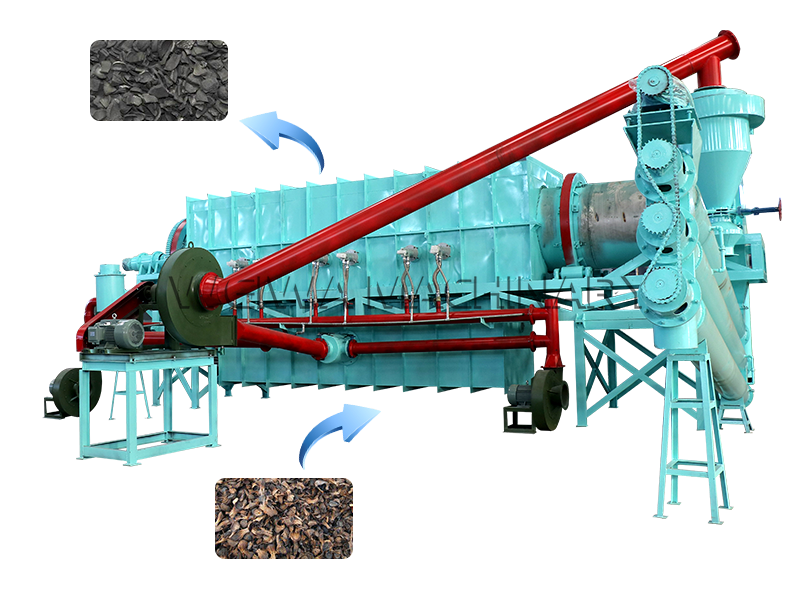Meeting Indonesia’s Growing Demand for Charcoal Production
Indonesia, with its vast palm oil industry, generates significant amounts of palm fiber—a byproduct that holds immense potential for charcoal production. Our client, based in Indonesia, approached Weiwa Machinery with a clear goal: to carbonize palm fiber using our continuous carbonization furnace and then process the resulting charcoal into hookah charcoal using a hydraulic press.
However, the high tar content in palm fiber posed a major challenge—leading to frequent pipeline blockages during the carbonization process. Through close collaboration, our engineering team conducted on-site debugging in Indonesia, upgrading the continuous carbonization furnace to ensure smooth operations.
Why Continuous Carbonization Furnaces Are Ideal for Palm Fiber?
The Rise of Palm Fiber as a Charcoal Feedstock
Palm fiber, a fibrous residue from palm oil production, is often discarded or underutilized. However, when carbonized, it transforms into high-quality charcoal with excellent energy density—making it perfect for hookah charcoal, BBQ briquettes, and industrial applications.
Our continuous carbonization furnace for palm fiber offers:
- High efficiency with continuous feeding and discharging
- Stable temperature control for optimal carbonization
- Low emissions and energy-saving design
Indonesia’s Need for Reliable Carbonization Technology
With Indonesia being one of the world’s largest palm oil producers, there’s a growing demand for sustainable charcoal solutions. Our continuous carbonization furnace in Indonesia helps local businesses convert waste into profit while meeting environmental regulations.
Tar Buildup and Pipeline Blockages
Why Palm Fiber Causes Blockages
Palm fiber contains a high concentration of lignin and natural oils, which decompose during carbonization to form sticky tar. This tar can:
- Coat the inner walls of the furnace and pipes
- Solidify and obstruct airflow
- Reduce carbonization efficiency
Our initial tests showed that without modifications, the continuous carbonization furnace would require frequent shutdowns for cleaning—leading to downtime and reduced productivity.
Our On-Site Debugging Process in Indonesia
Our team traveled to the client’s facility to:
- Analyze the carbonization flow and identify blockage points
- Inspect the furnace’s internal structure for tar accumulation
- Test different temperature and feeding rates to minimize tar formation
Upgraded Pipeline Design for Smoother Operations
Key Modifications to the Continuous Carbonization Furnace
To combat tar buildup, we implemented three major upgrades:
1. Reinforced Internal Lining & Sloped Pipelines
- We adjusted the angle of the pipelines to allow tar to flow more naturally toward collection points.
- Added heat-resistant lining to prevent tar adhesion.
2. Enhanced Airflow & Ventilation System
- Improved gas circulation to reduce tar condensation.
- Installed additional vents to release excess tar vapors before they solidified.
3. Automated Tar Collection Mechanism
- Introduced a secondary condensation chamber to capture tar before it reached critical pipes.
- This ensured cleaner gas flow and longer operational periods without clogging.
Results After the Upgrade
- Reduced blockages by over 80%
- Increased continuous operation time from 6 hours to 24+ hours
- Higher charcoal yield with better quality
From Carbonization to Hookah Charcoal
Step 1: Carbonizing Palm Fiber in the Continuous Furnace
- The palm fiber is fed continuously into the furnace at controlled temperatures (450–600°C).
- The continuous carbonization process ensures uniform heating and minimal tar retention.
Step 2: Crushing & Mixing the Charcoal
- The resulting palm fiber charcoal is crushed to a fine powder.
- A binding agent (if needed) is mixed for optimal compression.
Step 3: Hydraulic Pressing into Hookah Charcoal
- The powdered charcoal is compressed using a hydraulic press into uniform hookah briquettes.
- Our client reported higher durability and better burning performance compared to traditional charcoal.
Why Choose Weiwa Machinery for Your Carbonization Needs?
With over 30 years of experience in biomass carbonization, Weiwa Machinery is a trusted partner for clients in Indonesia and beyond. Here’s what sets us apart:
Customized Solutions
- We design continuous carbonization furnaces tailored to your raw materials (palm fiber, wood, coconut shells, etc.).
- Our engineers provide detailed planning, drawings, and on-site support.
Professional After-Sales Service
- Our team offers remote troubleshooting and on-site debugging when needed.
- We ensure smooth operation from installation to daily use.
Proven Track Record in Indonesia
- We’ve successfully deployed continuous carbonization furnaces for multiple Indonesian clients, helping them turn waste into profitable charcoal products.
Overcoming Challenges, Delivering Results
The journey from palm fiber to hookah charcoal is not without hurdles—especially when dealing with high tar content. However, through innovative engineering and on-site collaboration, Weiwa Machinery delivered a reliable continuous carbonization furnace that now operates efficiently in Indonesia.
If you’re looking for a customized carbonization solution for palm fiber, wood, or other biomass, our team is ready to help.
About Weiwa Machinery
With 30+ years of expertise in charcoal making machines and carbonization technology, Weiwa Machinery specializes in designing, manufacturing, and installing continuous carbonization furnaces for global clients. Our professional after-sales team ensures smooth operation, and we offer customized solutions with detailed planning and on-site support.
Contact us today for a free consultation and quotation!
- Mob:+8613838093177
- Whatsapp:+8613838093177
- E-Mail:info@cjlmachinegroup.com





 Wechat
Wechat

 +8613838093177
+8613838093177